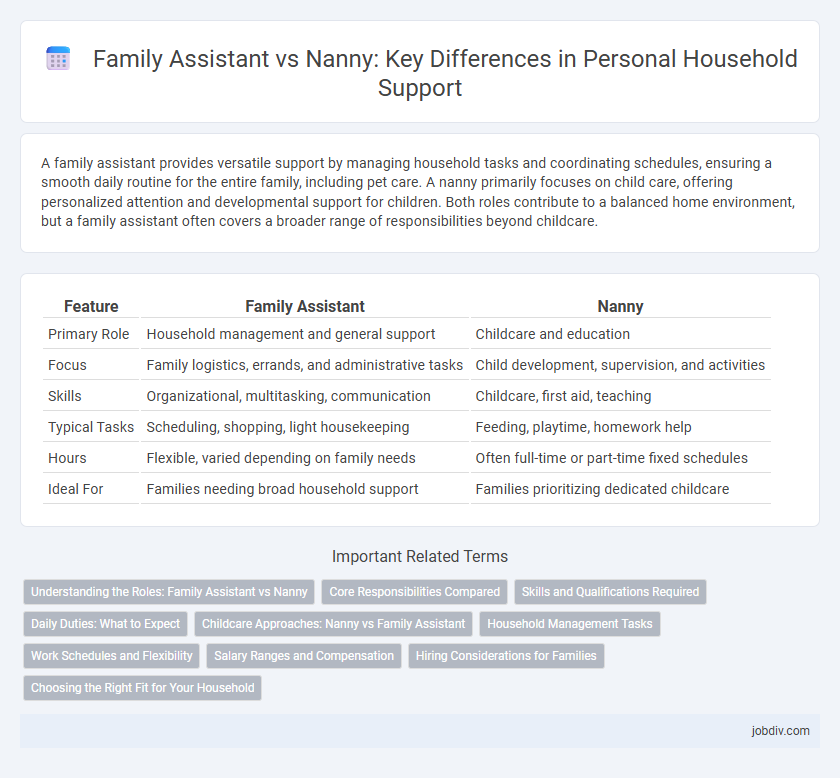A family assistant provides versatile support by managing household tasks and coordinating schedules, ensuring a smooth daily routine for the entire family, including pet care. A nanny primarily focuses on child care, offering personalized attention and developmental support for children. Both roles contribute to a balanced home environment, but a family assistant often covers a broader range of responsibilities beyond childcare.
Table of Comparison
| Feature | Family Assistant | Nanny |
|---|---|---|
| Primary Role | Household management and general support | Childcare and education |
| Focus | Family logistics, errands, and administrative tasks | Child development, supervision, and activities |
| Skills | Organizational, multitasking, communication | Childcare, first aid, teaching |
| Typical Tasks | Scheduling, shopping, light housekeeping | Feeding, playtime, homework help |
| Hours | Flexible, varied depending on family needs | Often full-time or part-time fixed schedules |
| Ideal For | Families needing broad household support | Families prioritizing dedicated childcare |
Understanding the Roles: Family Assistant vs Nanny
A family assistant manages a wide range of household tasks including scheduling appointments, running errands, and coordinating family activities, while a nanny focuses primarily on child care and development. Family assistants provide versatile support to maintain overall household efficiency, whereas nannies build emotional bonds through direct caregiving and educational engagement with children. Understanding these distinctions helps families select the right professional tailored to their specific needs.
Core Responsibilities Compared
Family assistants manage a broad range of household tasks, including scheduling, errands, and light housekeeping, ensuring smooth daily operations. Nannies primarily focus on child care, encompassing activities like feeding, education support, and emotional development. While both roles support family life, family assistants have a more diverse scope beyond child-oriented duties.
Skills and Qualifications Required
Family assistants typically require strong organizational, multitasking, and communication skills, along with experience in household management and light childcare, making them versatile in handling various family needs. Nannies usually need formal childcare qualifications such as CPR certification, early childhood education credentials, and hands-on experience in child development to provide dedicated, professional care. Both roles demand reliability, trustworthiness, and an understanding of family dynamics, but nannies focus more on child-specific expertise while family assistants cover broader household responsibilities.
Daily Duties: What to Expect
A family assistant manages a broad range of daily duties including scheduling appointments, running errands, and coordinating household tasks, while a nanny primarily focuses on childcare responsibilities such as feeding, bathing, and educational activities. Expect a family assistant to provide organizational support that extends beyond child supervision, balancing administrative and domestic duties. A nanny's role centers on nurturing and developing children's needs, ensuring consistent care throughout the day.
Childcare Approaches: Nanny vs Family Assistant
A nanny typically provides personalized, consistent childcare focusing exclusively on the child's daily needs, routines, and development, often forming a strong emotional bond. A family assistant offers broader support including childcare, household management, scheduling, and errands, delivering a more multifaceted approach to family care. Parents seeking dedicated one-on-one childcare prioritize nannies, while those needing comprehensive family support may prefer a family assistant.
Household Management Tasks
A Family Assistant handles a broad range of household management tasks such as scheduling appointments, coordinating home maintenance, running errands, and overseeing vendors to ensure smooth daily operations. Nannies primarily focus on child care duties like feeding, bathing, and educational activities, with limited involvement in general household responsibilities. Families seeking comprehensive household support benefit from a Family Assistant's multitasking skills that extend beyond childcare to overall household organization.
Work Schedules and Flexibility
Family assistants typically offer more flexible work schedules, adapting to varying household needs such as errands, appointments, and childcare, often providing part-time or as-needed support. Nannies usually adhere to fixed daily hours dedicated primarily to childcare, making them ideal for families requiring consistent, full-time child supervision. Evaluating work schedules and flexibility helps families choose between a family assistant's versatile role and a nanny's structured childcare focus.
Salary Ranges and Compensation
Family assistants typically earn between $25,000 and $60,000 annually, depending on experience and location, with some positions offering bonuses or benefits like health insurance. Nannies generally command higher salaries ranging from $30,000 to $70,000 per year, influenced by qualifications, childcare experience, and the number of children cared for. Compensation packages for nannies often include paid time off, room and board, and additional benefits, making the overall remuneration competitive within the childcare sector.
Hiring Considerations for Families
Hiring a family assistant offers versatile support beyond childcare, including household management and scheduling, while a nanny primarily focuses on child supervision and development. Families should consider workload complexity, budget constraints, and desired qualifications when choosing between the two roles. Background checks, experience in child care, and personal compatibility remain critical factors in both hiring decisions.
Choosing the Right Fit for Your Household
A family assistant offers versatile support, handling tasks from scheduling appointments to managing household errands, making them ideal for busy families needing comprehensive help. A nanny provides specialized childcare, focusing on the emotional and developmental needs of children through consistent care and structured routines. Evaluating your household's specific needs, budget, and lifestyle ensures selecting a role that enhances family dynamics while maintaining a balanced home environment.
Family Assistant vs Nanny Infographic

 jobdiv.com
jobdiv.com